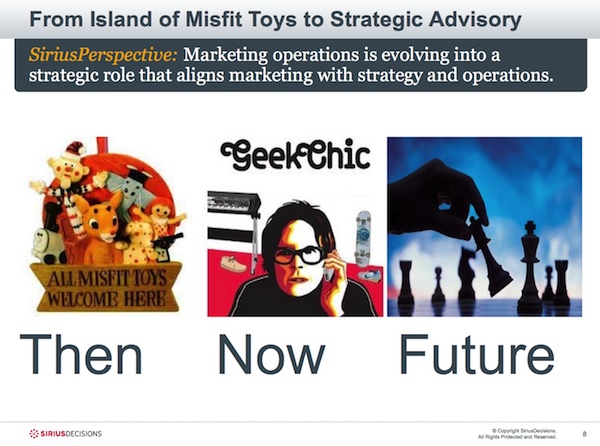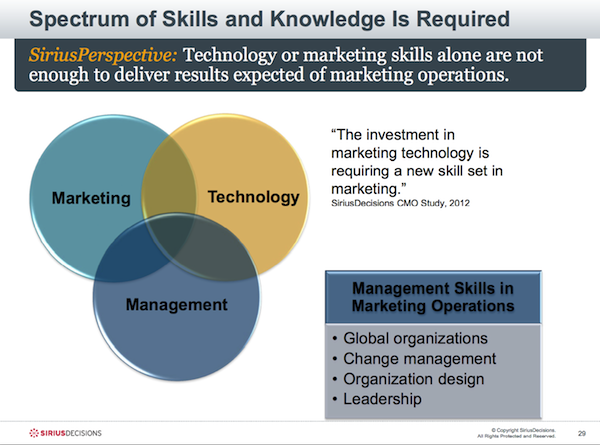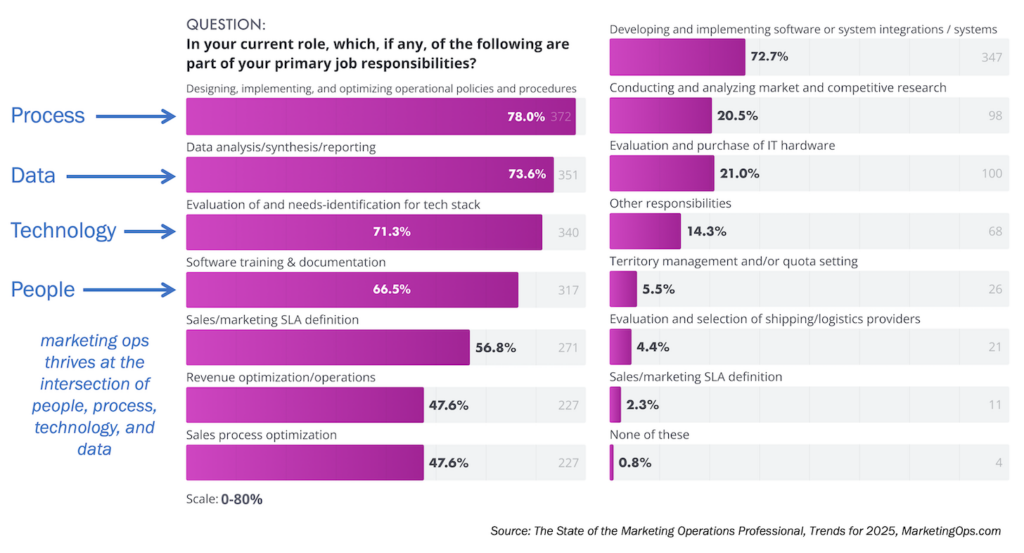
Last month, I attended the Marketing Operations Executive Summit — an intimate gathering of around 100 marketing operations executives — to give a talk on agile marketing.
What I left with, however, was a profound appreciation for the ascendency of the marketing operations role.
In the words of Craig Moore, a director at Sirius Decisions and the opening speaker, until recently, marketing operations was the island of misfit toys. It was definitely not the sexy side of marketing. It had little funding and little influence. If there was a metaphorical basement in the House Of Marketing, marketing operations was down there, shoveling data like coal.
But then a funny thing happened. The world got wired. Geek became chic. Customers were being won (or lost) by the experiences they had with companies on the web, with email, and via mobile devices. Data and software were moving from the back office to the front office. And the center of gravity in marketing started to shift to those who could make that machinery work.
In the land of non-technical marketers, might the marketing ops team be king?
Good operations is good marketing
According to the B2B marketing research that Craig presented, 67% of the buyer’s journey is now online. As prospects loosen the status quo, commit to change, and explore possible solutions, they do that through search engines and social networks. They form their impressions of vendors based on content and experiences delivered to them via the web and email.
Almost all of this happens before they ever talk to a salesperson.
More and more, we’re hearing stories of prospects who — by the time they actually want to talk on the phone — know more about the company’s offerings and its competitors than the sales representatives they end up talking with. That’s a challenge for another post, but according to Craig, 52% of lost sales are now being attributed to a failure of sales enablement.
To impress prospects, the content from marketing and sales has to be consistently great and the machinery that delivers it — the right content to the right people at the right time — has to function properly, almost frictionlessly. And the sophistication of that marketing machinery is continuing to grow explosively (see the marketing technology landscape for a representative sample).
So who runs all this rainmaking marketing machinery?
For many years, I’ve advocated for a role of a chief marketing technologist, who could serve at the right hand of the CMO as a kind of CTO of the marketing department. This role would be responsible for marketing technology strategy and operations. Forrester Research agreed with the recommendation of a marketing technology office. Gartner confirmed that over 70% of high-tech organizations recently surveyed now have that role (although titles for the role run the gamut).
I still believe this role is more important than ever.
But listening to Craig frame the rapid evolution of marketing operations, it struck me that marketing operations may be the right home for marketing technology leadership. Either the head of marketing operations is effectively the chief marketing technologist, or a chief marketing technologist reports to him or her.
This wasn’t a particularly brilliant leap of intuition on my part — Craig came right out and said it: “The marketing operations leader becomes the CIO of marketing. Dealing with the marketing systems and the way that marketers use them is a role for marketing operations.”
The difference between a marketing technology office and a marketing operations group, however, is that marketing operations encompasses a broader collection of interrelated operational responsibilities, covering ROI, accountability, process optimization, and marketing enablement:
- Reporting and analytics
- Budget management
- Planning
- Process management
- Best practice syndication and training
- Marketing systems
- Data management and quality
- Market intelligence
Note that effectively all of these responsibilities are driven by software and data.
To fulfill these responsibilities, marketing operations is hungrily assimilating technology talent into its ranks, acquiring tech-savvy people from IT and students graduating college with technical degrees. At the summit, at least 1 in 8 people I talked to were IT folks or product developers who were transitioning into marketing operations.
Marketing operations also increasingly has a well-defined budget. “Marketing operations expands until economy of scale is reached, where ops full-time employees and budget are about 5% of marketing,” Craig reported.
And because marketing operations touches almost every other facet of marketing through process and enablement — as well as interfacing to sales, finance, the product organization, and IT — marketing operations is in the unique position to see across departments and silos in connecting the dots of the buyer’s journey. In the land of cross-silo blind men, marketing operations becomes the proverbial one-eyed king.
This why Craig believes that marketing operations will emerge as the strategic advisor to the CMO. Functioning as a “chief of staff,” the head of marketing operations will lead high-priority initiatives, shape organizational design, identify emerging marketing trends and best practices, and prepare a strategic budget.
Marketing operations leaders will be particularly well suited at the crossroads of marketing because they will be some of the few who speak all the key dialects of the Corporate Tower of Babel:
- “project and tech” to IT
- “balance sheet” to finance
- “pipeline” to sales
But — and it’s a big but — Craig cautions that for marketing operations leaders to truly realize that potential, they need to have more than just marketing and technology skills. They must also bring general management skills to the table — leadership, organizational design, change management, and global operational savvy:

As I look at the above diagram, I can’t help but think of the masthead for this blog: marketing, technology, management. I’ve always thought of that intersection as the sweet spot for a chief marketing technologist. But rolling that mission under a larger umbrella of marketing operations — elevating both disciplines to something greater than their origins — is an exciting idea.
I’ve said before that he who controls the software controls the marketing. If you add on top of that control of data, control of budget accountability, control of best practices, and control of cross-silo marketing and sales visibility and coordination, marketing operations may very well may become king.



Scott, thanks for a great summary of the event! Good to see a professional gathering of marketing operations professionals. Henry Stewart had a conference (more neutral ground than this one, which was sponsored by a vendor) back in 2005-06-07 but dropped it to focus on digital asset management. Its long overdue, for the reasons you point out.
What Craig spoke about is true, but not new; these themes emerged around 2008-2009 (glad to provide references). I was fortunate to find a “chief of staff” role in 2010 under a CMO in a large, global enterprise, with oversight of marketing automation technology, planning, budgeting and department operations. When you do it right, it really works!!
My concerns for today is that marketing operations has been relegated to running demand generation in a lot of companies, especially mid-sized ones. That’s a good role, of course, but doesn’t include the broader roles Craig describes, and is often 2-3 levels below the CMO.
Hi, Mayer. Thanks for putting this in context.
It definitely feels like there are many competing models for the re-organization of the marketing department. On some level, that’s fascinating to watch, to see the pros and cons of the different approaches. But it’s more challenging when these different models start competing within a company. Marketing technology, marketing operations, and demand generation feel like they’re sloshing around still.
I remember hearing about those Henry Stewart events, and I was disappointed that they didn’t continue. Hopefully we’ll see more events focused on this space moving forward. More than anything, it helps to hear people share their stories of these different models, what worked, what didn’t, and how their thinking is evolving.
Scott, great article and summary – thanks for sharing. I do agree with all the points made – I have been defining MO strategies for global players for a few years now and I can say that such principles go back at least to 2005, the year I first got involved in building the Marketing operations practice for a global technology marketer. It’s also true that the MO owner is the CMO’s Chief of Staff, however the role extends beyond the confines of the Marketer organization – to be successful, the MO structure and processes have to be mirrored at the agencies and other service vendors engaged in all marketing activities.
I am also interested in getting some information on the MO Exec Summit; would you mind sending me a PM with your contact details? Many thanks.
Thank, Adele — glad to hear this resonated with you.
The ascendency of marketing as increasingly the center of the business is very exciting to watch — and having marketing operations be think organizing force within that mission makes a lot of sense to me.
But as Mayer pointed out above, this is still far from universal.
I suspect that what many folks would find most helpful at this point is stories and case studies of companies that have successfully navigated this transition.
That’s bang on the buck. Marketing ops is the new sexy. Marketing technologist will be the most sought after roles in the next 5 years. Marketers get your techie hats on and techies – well pick up the latest book from Kotler. These two groups of folks will joust for these roles.
Great post. Botom line is every CMO needs a marketing CIO. What is happening in some smaller companies is the CMO is being REPLACED by the marketing CIO, which is probably a bridge too far.
I’ve said it before….I’m going to say it again……Scott – you are brilliant! Great seeing of at the event. I was fortunate enough to attend a Henry Stewart Marketing Operations event many years ago! My passion for Marketing Operations was sparked by IDC in 2005. Their coverage of the role is excellent, as is SiriusDecisions.
Another terrific post – you’ve nailed it. In 2013 and beyond, marketers need to be carefully tuned to the needs of prospects they may not yet know and customers they may not know are ready to buy again. The only scalable and reliable way to do that is through the mastery of technology and process married to strong marketing tactics. I’ll keep reading everything you write.
Super valuable analysis!
The Forrester data I have seen gives an even higher MktgOps budget allocation, further supporting your insight!
Cheers
S